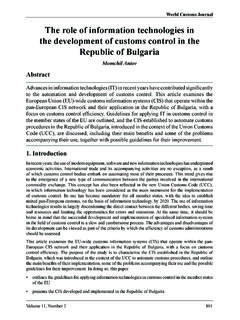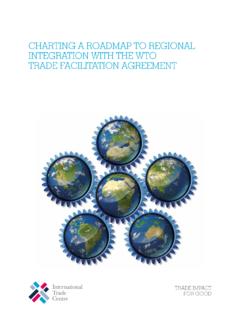Transcription of The Union Customs Code (UCC) - customs-law.expert
1 The Union Customs code (UCC). Attorney Michael Lux Former EU Commission Head of Unit Customs Procedures . Overview 1. Objectives of the UCC. 2. The main changes 3. The transitional rules 4. Preparations for the transition to the new rules 2. Part 1 Objectives of the UCC. 3. 1. Objectives of the UCC. Replace the current Customs code and the not yet applicable Modernized Customs code Adjust the Customs code to the Lisbon Treaty, in particular with regard to the new provisions on delegated and implementing acts, and by using the new terms ( Union instead of Community goods). Streamline and modernize Customs procedures and processes for which IT systems should be the normal tool Create throughout the EU harmonized IT processes by combining legislation with an IT work programme with the aim of achieving the full use of IT and harmonized processes by the end of 2020.
2 Provide until the end of 2020 for transitional measures, allowing for paper-based processes where no IT systems are available, and for pilot projects with simplifications 4. 2. Title I: General provisions definitions, decisions New definitions (Art. 5), inter alia for permanent establishment Establishing rules for the exchange and storage of data (Art. 6, transitional measures in Art. 278). Customs representation (Art. 18, 19): Member States may no longer restrict direct or indirect representation to Customs agents established in that Member State Decisions (Art. 22, 23): new process with deadlines for acceptance of application and granting of decision; monitoring and suspension; obligation to inform Customs about factors which may influence the continuation or content of the decision Binding tariff and origin information (Art.)
3 33 35): valid for three years, also the holder is bound, extension to Customs value possible (but not implemented); the Commission may suspend the issuing of BTI and BOI in case of divergent decisions by Member States 5. 2. Title I: General provisions AEO (1). New criteria (Art. 39): no serious or repeated infringement of taxation rules no record of serious criminal offences relating to the economic activity professional qualifications New benefits: Customs representation in Member States with restrictions for Customs agents (Art. 18 (3)). deferred payment with reduced guarantee (Art. 95 (3)). moving goods to another Member State under temporary storage (Art. 148 (5) (b)). centralised clearance with another Member State (Art.
4 179). entry in the records with notification waiver (Art. 182). self-assessment (Art. 185). 6. 2. Title I: General provisions AEO (2). AEO ( Customs simplification) the following conditions are deemed to be fulfilled: to be granted a comprehensive guarantee (Art. 95 (1), (2)). proper conduct of temporary storage (Art. 148 (2) (b)). proper conduct of special procedures (Art. 211 (3) (b)). appropriate records for special procedures (Art. 214 (2)). proper conduct in using equivalent goods (Art. 223 (2)). Possibility of recognizing AEO status granted outside the EU. even without international agreement (Art. 38 (7)). 7. 2. Title I: General provisions sanctions, fees List of administrative sanctions (Art. 42); see also proposal for a Directive on the harmonization of sanctions (COM.
5 (2013) 884, ). List of fees that may be charged by Customs (Art. 52) . already in force 8. 2. Title II: Application of import duties - origin Suppression of Art. 25 CC (circumvention of origin) but re- introduction in Art. 33 DA. Introduction of regulations determining the origin of individual goods (Art. 57, 67). Non-preferential origin certificates may be issued for export according to the rules of the country of destination (Art. 61). More non-preferential origin rules transformed into a regulation (Art. 62, Annex 22-01 DA) so that the scope of the non-binding list rules will be reduced 9. 2. Title II: Application of import duties Customs value (1). Abolition of the possibility to use earlier sales as transaction value (Art.
6 128 IA): 1. The transaction value of the goods sold for export to the Customs territory of the Union shall be determined at the time of acceptance of the Customs declaration on the basis of the sale occurring immediately before the goods were brought into that Customs territory. 2. Where the goods are sold for export to the Customs territory of the Union not before they were brought into that Customs territory but while in temporary storage or while placed under a special procedure other than internal transit, end-use or outward processing, the transaction value will be determined on the basis of that sale. Transitional rule (until 31 December 2017) in Art. 347 IA: The transaction value of the goods may be determined on the basis of a sale occurring before the sale referred to in Article 128(1) of this Regulation where the person on whose behalf the declaration is lodged is bound by a contract concluded prior to [Entry into force of this Regulation].
7 10. 2. Title II: Application of import duties Customs value (2). Art. 136(4) IA. Royalties and licence fees are considered to be paid as a condition of sale for the imported goods when any of the following conditions is met: - the seller or a person related to the seller requires the buyer to make this payment;. - the payment by the buyer is made to satisfy an obligation of the seller, in accordance with contractual obligations;. - the goods cannot be sold to, or purchased by, the buyer without payment of the royalties or license fees to a licensor. Art. 157(2) CCIP: [ ] a royalty or licence fee shall be added to the price actually paid or payable only when this payment: - is related to the goods being valued, and - constitutes a condition of sale of those goods.
8 11. 2. Title III: Customs debt, guarantees (1). Any person providing wrong information for the drafting of a Customs declaration may become debtor (Art. 77 (3), 79 (4)). Persons acting on behalf of a person obliged to fulfill an obligation and persons participating in the act leading to the non-fulfillment of the obligation may become debtors (Art. 79 (3) (b)). Alignment and merger of the provisions on the incurrence of an irregular Customs debt leading to more possible debtors (Art. 79). Simplification of the provisions concerning the assessment of a Customs debt basic rule: duties are assessed according to the conditions at the time the debt is incurred (Art. 85). Costs for storage and usual forms of handling in case of proof not taken into account; same for classification changes (Art.)
9 86(1, 2)). Duty relief after outward processing calculated on the basis of the value added (Art. 86 (5)). 12. 2. Title III: Customs debt, guarantees (2). Comprehensive guarantees can be provided for several procedures, temporary storage and deferred payment (Art. 89 (5), 95). Comprehensive guarantees may be authorised for a reduced amount or waiver; if the comprehensive guarantee covers an existing debt (deferred payment), only a reduced guarantee may be authorized and the debtor must be AEO ( Customs simplification). Relief from post-clearance recovery incorporated in the rules for repayment/remission of Customs duties (Art. 116 121). Obvious negligence is no longer relevant, except for relief on the basis of equity (Art.
10 120), and the condition that the debtor could not reasonably have detected an error (Art. 119). More possibilities for an extinction of the Customs debt (Art. 124) if no deception was attempted Examples: correction of an error (provided the type of error is listed in Art. 103 DA), re-export of the goods 13. 2. Title IV: Bringing goods into the EU. Successive and multiple filing for entry summary declarations may be introduced later (Art. 127). Entry summary declaration can be combined with declaration for temporary storage (Art. 129); declaration data will be changed once the IT systems have been adjusted For temporary storage (Art. 144 149). the storage period is prolonged to 90 days an authorisation and a guarantee is required for the authorised storage facility movement to another place or storage holder ( without NCTS), even to another Member State, can be authorised only AEO ( Customs simplification) may be authorised to move goods to another Member State 14.






